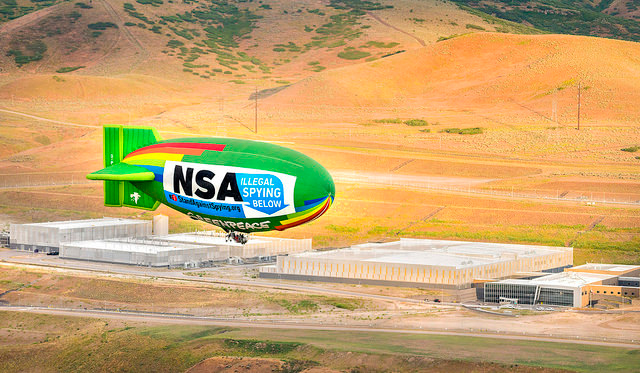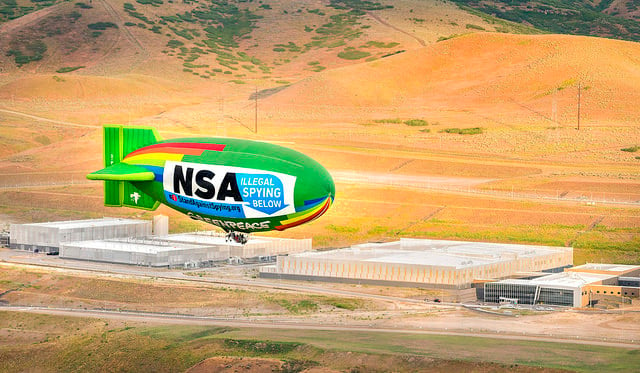
 A coalition of grassroots groups from across the political spectrum joined forces to fly an airship over the NSA’s data center in Bluffdale, Utah on Friday, June 27, 2014, to protest the government’s illegal mass surveillance program. The environmental group Greenpeace flew its 135′ long thermal airship over the data center carrying the message “NSA Illegal Spying Below”. (Photo: EFF Photos / Greenpeace)
A coalition of grassroots groups from across the political spectrum joined forces to fly an airship over the NSA’s data center in Bluffdale, Utah on Friday, June 27, 2014, to protest the government’s illegal mass surveillance program. The environmental group Greenpeace flew its 135′ long thermal airship over the data center carrying the message “NSA Illegal Spying Below”. (Photo: EFF Photos / Greenpeace)
The failure of Congress to pass any meaningful reform of National Security Agency (NSA) surveillance powers has many activists looking for another approach to stop the massive spy agency. But if a state representative in Utah has his way, that approach will be to turn off the agency’s water, and his state will be ground zero.
Less than 24 hours after reports broke that the USA Freedom Act failed to move forward in the Senate, a powerful interim committee for public utilities in the Utah state legislature held a hearing on a bill there that would start the process of turning off water and other state assistance to the recently-opened NSA data center in Bluffdale.
Introduced by Rep. Marc Roberts (R- Santaquin) late in the 2014 legislative session, the 4th Amendment Protection Act is a response to what many see as a violation of not just privacy rights by the NSA, but of public trust as well.
“The data center here was welcomed by the state of Utah with a promise that their activities would remain within Constitutional bounds,” said Roberts. “I think we all know and are aware that has been violated,” he continued.
The hearing was an opportunity for the bill to receive public input before it is formally reintroduced for the 2015 legislative session. One inside source said that committee members received “tons of emails” from the public in favor of the bill.
According to statements made at the hearing, when operating at full capacity, the NSA data center will require 1.7 million gallons of water to function each day, primarily to keep the servers from overheating and shutting down.
One committee member suggested that the NSA would simply reuse the water over and over in a closed loop, but a local data-center expert refuted this claim.
“A lot of the water that is consumed is evaporated into the atmosphere and is not sent back into the system,” said Pete Ashdown, the founder and CEO of Utah’s first independent and oldest internet service provider, XMission.
“What this tells us, first and foremost, is that this NSA facility cannot operate without Utah’s help,” said Mike Maharrey, executive director of the OffNow Project whose model legislation the Utah bill is based on. “And as Nevada showed us by turning off water to the Department of Energy (DOE), this strategy actually works,” he continued.
Over a number of years, Nevada denied the DOE’s five applications for the use of water to construct and operate the proposed high-level nuclear waste repository at Yucca Mountain. By doing so, they held the construction process up in court long enough that the project became unsustainable.
And in a 2007 ruling, a US district court in Las Vegas sided with the state. “The validity of Western states’ groundwater rights and the right to regulate water in the public interest is not a right to be taken lightly, nor is it a right that can cavalierly be ignored or violated by a federal agency,” wrote Judge Roger L. Hunt.
A Salt Lake Tribune report late last year noted that the NSA was getting a sweetheart deal on water. “Bluffdale agreed to sell water to the National Security Agency at a rate below its own guidelines and the Utah average in order to secure the contract and spur economic development in the town,” wrote Nate Carlisle of the Tribune.
But determining just how much water the facility is using has been “difficult” according to Roberts. “I’ve tried to get that information from Bluffdale, but they won’t disclose it,” he said. Roberts also noted that at full capacity, usage would be equivalent to that used by more than 21,000 people, which in a state where water shortages and restrictions are common, was concerning to some.
“I’m concerned about not subsidizing the costs of this on the backs of Utah citizens,” said one committee member.
“For 40 years we’ve waited on Congress to get the job done, and they failed once again,” Maharrey continued, referring to Sen. Frank Church’s 1975 warning about NSA powers. “We’re done waiting for Congress to stop the NSA, and with bills like this, we’ll stop the NSA whether Congress wants to or not.”
Ashdown agreed. “I opposed the effort to turn off the water to the NSA data center last year because I was hoping the federal Congress would take action,” he said. “They have tried three times to take action and failed three times. So I really do think it is a state issue at this point to show that we do not support these infringements on our rights.”
According to Maharrey, a strong grassroots showing in the states is the path forward. “The only way we’re going to win is if people get on the phone in all 50 states, urging their state representatives to introduce and support the 4th Amendment Protection Act.”
Join us in defending the truth before it’s too late
The future of independent journalism is uncertain, and the consequences of losing it are too grave to ignore. To ensure Truthout remains safe, strong, and free, we need to raise $43,000 in the next 6 days. Every dollar raised goes directly toward the costs of producing news you can trust.
Please give what you can — because by supporting us with a tax-deductible donation, you’re not just preserving a source of news, you’re helping to safeguard what’s left of our democracy.